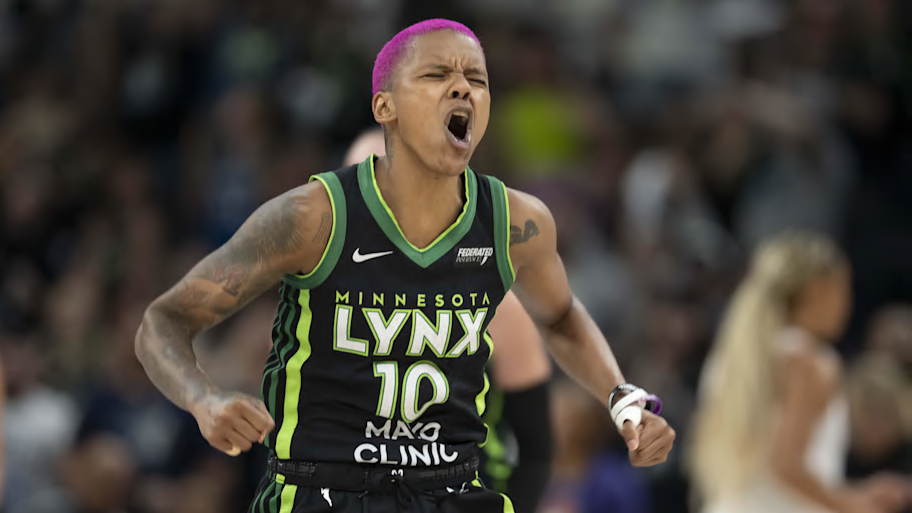MINNEAPOLIS — Cheryl Reeve described the locker room conversation at halftime in the same terms one might use to praise a brainstorming session at a corporate retreat. “It was collaborative,” said the Lynx coach. “They were all engaged.” Her group had entered the locker room down by seven. It would return an hour later with a comfortable win.
But that is standard operating procedure in Minnesota. The No. 1 seed Lynx make almost everything look easy. They can play with a sense of urgency but without any panic. This is not a perfect team. But it’s such a calm, balanced, cohesive one that it can sometimes be possible to believe otherwise.
The Lynx shut down the Mercury in the second half to win Game 1 of the WNBA semifinals by a score of 82–69.
If Minnesota’s halftime conversation had been a collaborative example of group engagement, its performance that followed was, too. This was the first game of the season in which both Courtney Williams and Kayla McBride scored more than 20 points: Williams led all scorers with 23 and McBride finished with 21. Both guards did their best work in the second half. They were joined by Napheesa Collier, who scored six consecutive points to take the lead in the third quarter, and Bridget Carleton, who helped them keep it with her rebounding and a pair of timely baskets. And some of the biggest minutes of the game came from reserve Maria Kliundikova. The center logged twice as much time in just the second half today as she had in both games of the first round combined.
This is how the Lynx prefer to win. All year, they have joked about being fueled by the power of friendship, and if that might be a bit reductive, it’s hard to argue they are not fueled by the power of sharing. Minnesota set a WNBA record for assists this season at 23.3 per game—breaking the record this same group set last season. It regularly makes big asks of the bench. (Consider that Minnesota has both the second- and third-place candidates for Sixth Player of the Year in Natisha Hiedeman and Jessica Shepard.) Cheesy as it may sound, they really do play like a team whose halftime discussions can fairly be described as “collaborative,” defined by their level of group engagement.
“In those moments, when we need to brainstorm or whatever, it’s never like we’re all on islands,” McBride said. “We’re doing it together. That’s really what it is. We’re just trying to problem-solve.”
What they needed to solve here was the problem they faced in Alyssa Thomas. The forward had 16 points in the first half for Phoenix—nearly all of them in the paint, slicing through to the basket seemingly at will, no matter who or what might be in her way. The primary assignment on her belonged to Collier. But the Mercury have a knack for triggering coverage that forces smaller guards to switch on to Thomas. And so here was the subject of their halftime brainstorming.
Thomas had just two points in the second half.
Minnesota’s adjustment was partially a matter of switching up looks and forcing Phoenix to turn to options besides Thomas. It was partially a matter of introducing Kliundikova. While she gets limited minutes, she has the longest wingspan on this roster, and there may be no member of this group who has better raw tools for rim protection. (That includes co-Defensive Player of the Year Alanna Smith.) She did not see the floor in the first half. But then Reeve put Kliundikova out instead of Smith. In just eight minutes of play, she recorded four rebounds and two steals, and she finished +14.
“She was definitely a game-changer,” Williams said. “When you sit most of the game, you’ve got to come in and make that instant impact, you’ve just got to be mentally strong, and that’s exactly what she is.”
Game 1 was not an ideal outing for the Lynx. (Their first half was far too sluggish.) But it was something like an ideal display of their strengths. Their biggest star is Collier—who had been announced as MVP runner-up on Sunday—but their biggest asset is how they fit together as a unit. That’s instrumental not just to why they win but how they win.
“They problem-solve together. They don’t finger-point,” Reeve said. “It’s a mature group, emotionally mature, and I didn’t do anything to bring that along. That’s just who they’ve always, always been.”
Which, again, might feel like a compliment better suited for an especially productive office unit. But it’s befitting a group who make winning this way feel like business as usual.
SI WNBA Playoffs
This article was originally published on www.si.com as Lynx Share the Wealth in Game 1 Comeback vs. Mercury.
